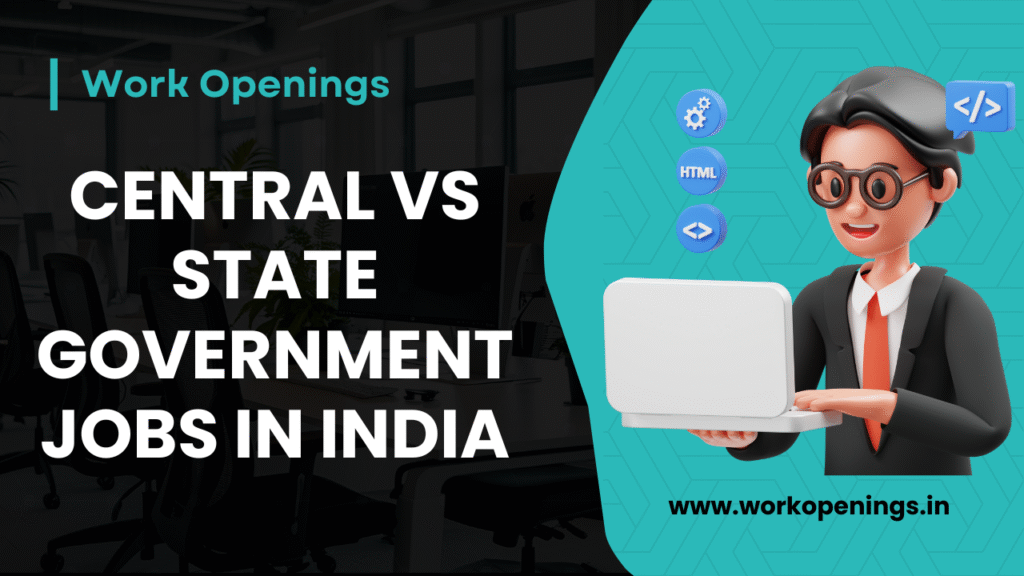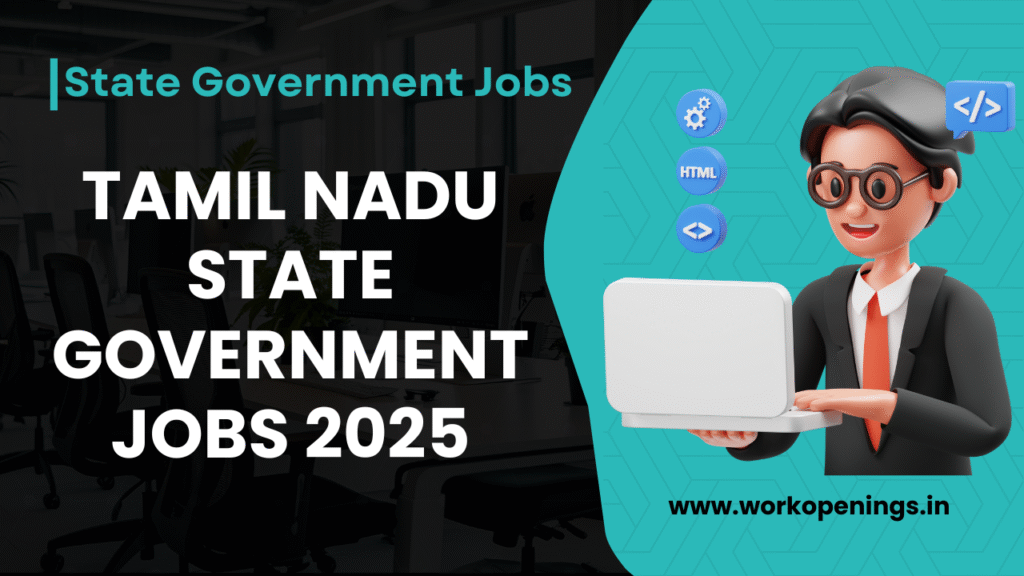For millions of young Indians, a “Sarkari Naukri” or government job is the ultimate career aspiration. It promises stability, respect, and a life of security. However, the path to securing one is paved with a crucial decision: should you aim for a Central Government job or a State Government job? This dilemma, often summarized as the Central vs State Government Jobs in India debate, can be confusing. Do you prepare for the prestigious UPSC Civil Services, the nationwide SSC CGL, or focus on your home state’s Public Service Commission (PSC) like TNPSC or UPPSC?
This comprehensive analysis will dissect the pros and cons of both avenues. We will delve into every critical aspect, from salary and promotions to work-life balance and social prestige, to help you make an informed decision that aligns with your personal and professional goals.
Table of Contents
What are Central and State Government Jobs?
Before we dive into the comparison, let’s clarify the basics.
Central Government Jobs: These are positions within the ministries, departments, and organizations directly under the purview of the Government of India. Recruitment for these posts is conducted by national-level bodies.
- Key Recruiting Agencies: Union Public Service Commission (UPSC), Staff Selection Commission (SSC), Railway Recruitment Boards (RRB), Institute of Banking Personnel Selection (IBPS for PSU Banks), etc.
- Examples: Indian Administrative Service (IAS), Indian Police Service (IPS), Indian Foreign Service (IFS), Income Tax Inspector, Assistant Section Officer in Central Secretariat, Railway Station Master, Bank Probationary Officer (PO).
State Government Jobs: These are positions within the various ministries, departments, and public sector undertakings (PSUs) operating under a specific state government. Recruitment is managed by state-level agencies.
- Key Recruiting Agencies: State Public Service Commissions (e.g., Tamil Nadu Public Service Commission – TNPSC, Uttar Pradesh Public Service Commission – UPPSC, Maharashtra Public Service Commission – MPSC).
- Examples: Deputy Collector, Deputy Superintendent of Police (DSP), Block Development Officer (BDO), Tehsildar, State Secretariat Assistants, State Police Constable.
The Ultimate Comparison: Central vs State Government Jobs in India
Choosing between these two paths requires a careful evaluation of several factors. Let’s break down the Central vs State Government Jobs in India comparison point by point.
1. Salary, Allowances, and Pay Scale
This is often the most significant factor for many aspirants. While both sectors follow a Pay Commission structure, there are notable differences.
Central Government Jobs:
- Pros: Generally offer higher salaries and more lucrative allowances. The implementation of Pay Commissions (like the 7th Pay Commission) is uniform and timely across all central departments. Allowances like House Rent Allowance (HRA), Dearness Allowance (DA), and Travel Allowance (TA) are often higher, especially for those posted in ‘X’ category cities (major metros).
- Cons: The HRA you receive is strictly tied to your city of posting, which can vary significantly during transfers.
State Government Jobs:
- Pros: While the basic pay might be slightly lower initially compared to their central counterparts, some states offer competitive salaries to attract talent.
- Cons: The biggest drawback is the potential delay in the implementation of Pay Commissions. A state government might take years to adopt the recommendations of a new Central Pay Commission, leading to a significant pay gap. Allowances are also generally lower than in central government roles.
Verdict: For higher and more standardized pay packages, Central Government jobs clearly have the edge.
2. Career Growth and Promotions

A job is not just about the starting salary; it’s about the long-term career trajectory.
Central Government Jobs:
- Pros: Promotions are typically more structured, time-bound, and transparent. Bodies like the Department of Personnel and Training (DoPT) lay down clear guidelines for career progression. An All India Service officer (IAS, IPS) can rise to the highest echelons of bureaucracy, reaching positions like the Cabinet Secretary of India. The scope of work is vast, offering diverse experiences across different states and even countries (in the case of IFS).
- Cons: The vastness of the central machinery can sometimes make an individual feel like a small cog in a large wheel.
State Government Jobs:
- Pros: An officer can reach the highest position within the state bureaucracy, such as the Chief Secretary of the state. You develop deep expertise in the functioning and administration of a particular state.
- Cons: Promotions can be significantly slower and are sometimes influenced by political factors and state-specific cadre management policies. The promotional avenues might be limited compared to the diverse opportunities in the central government. This is a critical factor in the Central vs State Government Jobs in India analysis for ambitious candidates.
Verdict: Central jobs offer faster, more transparent promotions and a broader canvas for career growth.
3. Job Transfers and Posting Location
This is a lifestyle choice and a crucial differentiator.
Central Government Jobs:
- Pros: If you love to travel, explore new cultures, and live in different parts of India, this is a huge advantage. It provides unparalleled exposure to the diversity of the nation.
- Cons: This comes with a mandatory pan-India transfer liability. You could be posted anywhere from Arunachal Pradesh to Gujarat, which can be challenging for family life, children’s education, and caring for elderly parents. You are often far from your home state and cultural roots.
State Government Jobs:
- Pros: Your entire career will be spent within the geographical boundaries of your home state. This allows you to stay close to your family, culture, and social circle. It provides immense stability in terms of location, which is a major draw for many.
- Cons: You might be posted in remote rural areas of the state, but you will never be posted outside the state. The scope of exposure is limited to one state’s culture and administration.
Verdict: This is purely subjective. For those who prioritize staying near family, state jobs are ideal. For the adventurous, central jobs offer a life of exploration.
4. Work-Life Balance and Work Culture
The nature of work and the environment you work in can greatly impact your well-being.
Central Government Jobs:
- Pros: Departments in central ministries, especially in Delhi, are known for their professionalism and adherence to protocols. The work culture is often more formal and structured.
- Cons: Certain high-pressure jobs, like those in the security forces, investigative agencies, or top bureaucratic roles, can be extremely demanding with long working hours, impacting work-life balance.
State Government Jobs:
- Pros: The work pressure is often perceived as being more manageable compared to high-stakes central government roles. The ability to converse in the local language and deal with familiar cultural nuances can make the workplace feel more comfortable.
- Cons: The work culture can be more susceptible to local political interference. The pace of work might be slower, which can be frustrating for highly motivated individuals. The Central vs State Government Jobs in India debate often hinges on this perception of political pressure.
Verdict: Generally, state government jobs might offer a slightly better work-life balance, but this varies greatly depending on the specific department and role.
5. Prestige and Social Standing

In India, a government job comes with a great deal of social prestige.
Central Government Jobs:
- Pros: Positions like IAS, IPS, and IFS carry immense prestige and power on a national scale. An officer of an All India Service or a high-ranking central department commands respect across the country. The “Government of India” tag carries significant weight.
- Cons: Outside of major cities or your specific department, you might be an anonymous figure in the local community where you are posted.
State Government Jobs:
- Pros: A state civil servant, like a Deputy Collector or a DSP, wields considerable power and influence within their district and state. They are well-known and respected figures in their local community. This ground-level influence is a major attraction.
- Cons: This prestige and influence are limited to the boundaries of that particular state.
Verdict: Central jobs offer national prestige, while state jobs provide deep-rooted local influence and recognition.
Quick Comparison Table: Central vs State Government Jobs
| Feature | Central Government Jobs | State Government Jobs |
| Salary | Generally higher, uniform pay scale & allowances. | Can be lower, potential delays in pay commission implementation. |
| Transfers | Pan-India transfer liability. | Posting within the home state only. |
| Promotions | Faster, structured, and transparent. | Can be slower, may be influenced by local factors. |
| Prestige | National-level recognition and prestige. | High local influence and social standing within the state. |
| Exposure | Diverse exposure to different cultures and regions of India. | Deep expertise in the administration of one state. |
| Work-Life Balance | Can be demanding in high-pressure roles. | Generally perceived as more manageable. |
| Exam Syllabus | Vast, standardized syllabus (UPSC, SSC). | Syllabus focused on state-specific GK, history, and language. |
| Competition | Extremely high, attracts candidates from all over India. | High, but the pool is largely limited to the state’s residents. |
6. Exam Syllabus and Competition
The final hurdle is clearing the examination. The nature of the competition and syllabus is a key part of the Central vs State Government Jobs in India equation.
- Central Exams (UPSC, SSC): The syllabus is vast and standardized, covering a wide range of subjects with a focus on national issues. The competition is incredibly fierce as you compete with aspirants from every corner of the country.
- State Exams (TNPSC, MPSC): The syllabus includes general subjects but has a significant portion dedicated to the state’s history, geography, culture, and language. For some, this is an advantage. While the competition is high, the applicant pool is largely restricted to that state, which can be a strategic advantage for residents.
Making the right choice in the Central vs State Government Jobs in India dilemma is a deeply personal journey. There is no single “better” option.
Choose a Central Government Job if:
- You are ambitious and seek a faster career trajectory with national-level impact.
- A higher salary package and better allowances are your priority.
- You are adventurous, have no location constraints, and wish to experience the diversity of India.
- You can handle a vast syllabus and are ready to compete on an all-India level.
Choose a State Government Job if:
- You prioritize staying close to your family, roots, and culture.
- You prefer stability in terms of your posting location.
- You seek significant influence and recognition within your home state.
- You are more comfortable with a syllabus that includes regional knowledge and language.
Ultimately, the best approach is to introspect. Analyze your personality, your long-term life goals, your family situation, and your academic strengths. This introspection will guide you to the right path in the enduring quest for a coveted public sector career. The great Central vs State Government Jobs in India debate is best settled by the person who matters most: you.
Frequently Asked Questions (FAQs)
Q1: Which job offers more salary, Central or State? A: Generally, Central Government jobs offer a higher salary and more uniform allowances due to the timely implementation of Pay Commissions and higher HRA/TA rates in major cities.
Q2: Is it easier to get a state government job than a central one? A: The term “easier” is relative. While the competition pool in state exams is smaller (mostly limited to state residents), the number of vacancies can also be lower. Central exams have massive competition from across India, but they also often have a larger number of vacancies. The difficulty depends on your preparation and the specific exam.
Q3: Can I prepare for both Central and State Government exams simultaneously? A: Yes, many aspirants do. The core syllabus for subjects like History, Polity, Economy, and General Science often overlaps. However, you will need a dedicated strategy to cover the state-specific General Knowledge and language paper for state exams and the national-level current affairs for central exams.
Q4: Which offers better job security? A: Both Central and State Government jobs are renowned for offering excellent job security. This is one of the primary reasons they are so sought after. A government employee cannot be terminated easily, ensuring a stable career until retirement.
Q5: What about pension and retirement benefits? A: Both central and state governments have now largely shifted to the National Pension System (NPS) for employees who joined after 2004. It is a contributory pension scheme. However, healthcare benefits might differ, with the Central Government Health Scheme (CGHS) having a wider network across India compared to state-specific health schemes. This is another important aspect of the Central vs State Government Jobs in India consideration.

